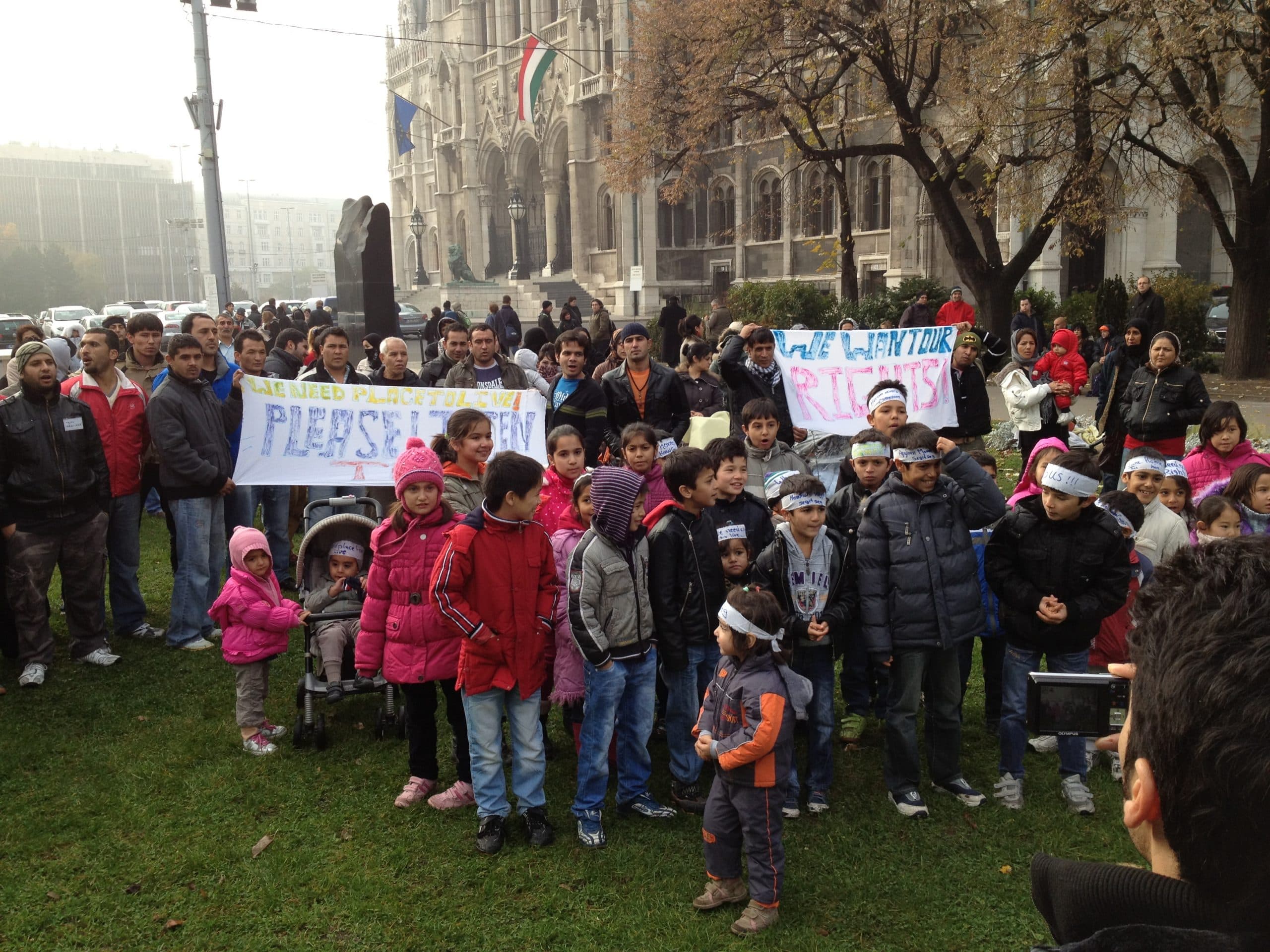‘Hungary, we are tired’
Protest of the refugees from Bicske.
Today, more than a hundred Afghan refugees came from the refugee camp in Bicske to Kossuth Square (to the Parliament). They came together to present their demands. The Ministry of Interior has already answered them. Even though the speed of the reply was commendable, saying little to nothing is not.
Six months after receiving refugee status and winter approaching, more and more refugees feel that their situation is becoming hopeless because of the inflexible state welfare regulation. Also, the almost impenetrable bureaucracy makes their situation so difficult that they feel they have no chance to start a new life, even though they are entitled to according to the law.
On Kossuth Square they chanted for hours seeking assistance from the Hungarian state. The words they chanted were sometimes naive and awkward, but the gathering consisting of mostly Afghan men, women and children was letting the public know in a very emotive way their demands: assistance, housing, work, and support for true integration. The most shocking was probably the grim sentence describing their state: “Hungary, we are tired.”
How did the refugees word the petition they submitted to the Ministry of Interior? “We, the organizers of the protest, above all, wish to express our gratitude and our thanks to the Hungarian state, and to all of its citizens for the protection and assistance afforded to us.
We, the organizers of this protest, who were granted international protection and live in the Bicske reception centre, ask for a chance to live as useful citizens in this land where we were forced to flee to in order to save our own lives and families. We would like to have a real chance to be part of Hungarian society and to contribute to the prosperity of this country with fair and honest work. However, after we obtained protection and the possibility to live in the Bicske refugee camp and to learn the language, as soon as we leave the camp we have to face the real danger of unemployment and homelessness.”
The refugees are asking for free housing until they can start an independent life. This demand may seem excessive, but remember, we are talking about 100-200 people, who, although on paper they have the same rights as Hungarian citizens, they have no relatives or friends who could assist them in trouble. Unfortunately, the homelessness of refugees is a real problem, already criticized by the UN High Commissioner for Refugees (UNHCR) in 2010. According to the UNHCR report published in April 2012 the current integration system is not able to provide the beneficiaries of international protection with the information and support necessary for integration.
Their other demands are completely understandable. In order to cope better with the initial difficulties of integration they would like to have more social workers to assist them, as well as language training with flexible conditions. They ask for interpreters during medical examinations so that they could convey their medical problems fully until their own knowledge of Hungarian is adequate enough.
Both the refugees and the organizations working with them complain about the lack of an integration strategy for refugees that, is both realistic and well-developed. In April this year the UN High Commissioner for Refugees warned: “In the absence of a governmental agency with specific responsibility for promoting refugee integration at community level, many refugees have no effective opportunity to exercise their rights as provided for under the 1951 Convention and in other international and regional human rights treaties, including the right to adequate housing. They rely mostly on fragmented, under-funded and project-based refugee support services in Budapest, which cannot provide solutions to what constitutes a structural problem, requiring a strategic and cross-departmental response.”
Nevertheless, in a hasty reaction to the protest and petition, which the Hungarian Ministry of Interior rather charmingly called a “Press Release, it was stated that “In Hungary the Office of the Immigration and Nationality (OIN) gives a wide range of support to refugees based on the existing asylum legislations in order to facilitate their social integration.” The personal experiences of refugees are, however, quite contrary to this.
The Hungarian Helsinki Committee has helped the refugees to announce their protest to the police because we sincerely hope that this move by the refugees will help them call attention to their problems. These people definitely deserve more than meaningless press releases. Refugees and beneficiaries of subsidiary protection, who were recognized by the state and were granted international protection, expect substantive responses and solutions from the Ministry and the OIN.
Thanks to Vera Kozma for the translation of the blog post by Júlia Iván.
